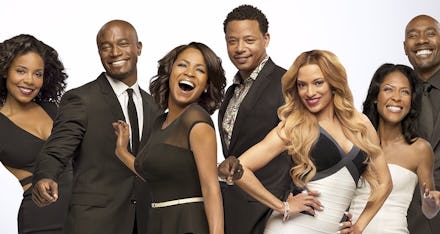Why White People Won't See "Black Movies"

“Why The Best Man Holiday Isn’t Race-Themed.”
That’s the title of an op-ed Olivia Cole wrote for The Huffington Post. It’s a good piece that articulates the feelings of anyone who face-palmed when they saw this groan-inducing USA Today tweet:
Cole’s article challenges the tweeter’s presumption that because a movie features a black cast, it must automatically be about race. She says Best Man Holiday is really just about friends getting together and doing friend-type shit (I clearly haven’t seen the film). But since white audiences are on some racist nonsense, it’s hard for them to, as Cole puts it, “see black people as beings separate from their blackness.” Therefore, a movie starring black people can’t just be a movie, a "normal" movie — a “normal” movie is a movie starring white people, because we’re in #Amurica, and “normal” means “white.”
You get the point. The conversation about Best Man Holiday is really only happening because, like Wu-Tang said, cash rules everything. People are shocked that Best Man Holiday is cashing out at the box office: they expected a $30 million-plus weekend from Thor 2, because it’s a superhero movie. But Best Man Holiday? Heads are exploding in disbelief.
This reaction is interesting. On paper, Thor 2 and Best Man Holiday share elements that should make their comparable box office success unsurprising. Both feature sexy people being sexy (in Thor 2 it’s Chris Hemsworth and Natalie Portman; in Best Man Holiday it’s … well, everybody). Both hover around 65% on Rotten Tomatoes and both count on reliable fan bases: Thor 2 has 14-year-old boys, and Best Man Holiday has everyone who saw The Best Man. So why the shock, especially from the mainstream press?
One reason might not surprise you: white people don’t watch “black movies.” And by “black movies,” I don’t mean that last thing Morgan Freeman was in, or the one where Eddie Murphy was the voice of that animal. I also don’t mean that “eye-opening” historical drama that made you finally admit, “Damn, America is racist.” I’m talking about “Where are all the white people?” movies. “Is it dark in here, or what?” movies. Movies with regular people, doing regular stuff — only those people happen to be black.
I’m making this claim not because it’s my opinion, but because it’s proven. Indiana University telecommunications professor Andrew J. Weaver completed a study in 2011 that confirms white audiences’ unwillingness to watch black people in romantic film roles. Opinions vary on why, but here’s what others have suggested:
1) The “racial empathy gap.” This idea comes from research done at the University of Toronto-Scarborough and the University of Milano-Bicocca. Findings suggest that people of all racial groups empathize less with black people than they do other races. Blame it on our conceptions of what being black means: researchers found that participants think black people lead crappier lives in general, so they’re desensitized and feel pain less deeply.
This is effed up, obviously. But it’s also hard to conclusively link this to white people’s movie-going habits, especially since black people apparently have the same trouble empathizing with other black people.
Which brings us to …
2) White people are scared they won’t “get it,” because black movies are written in some indecipherable secret “blackanese” code-language that only black people understand. Or, as Andrew Weaver writes, “White audiences perceive romantic films with minorities as ‘not for them’ because they seldom see minorities in race-neutral romantic roles.”
This is hilarious. I understand skipping a film about, say, sea urchins falling in love, because sea urchins have customs and communicate in ways that humans can’t decipher. It would make no sense to us. Plus, can a sea urchin love?
But black people are human, last time I checked. And it’s truly not weird to see humans act like humans, even if you live under a rock and aren’t used to seeing people with different skin colors do things that all humans do, like fall in love. The "that movie's for black people" excuse doesn't fly here. There may be some cultural references that elude white people in these films, but so what? That never stopped them from buying rap or R&B albums by the millions.
So why do white people wolf down black music like it’s the last piece of pie, but they won’t watch black films? And why is there such shock when a black movie does well? There’s clearly something in these films that make their blackness, or as USA Today would say, their “race-themed-ness,” especially hard to process, even when it's not integral to the movie.
I wish I had definitive answers to these questions, but for now, all I can do is ask them.